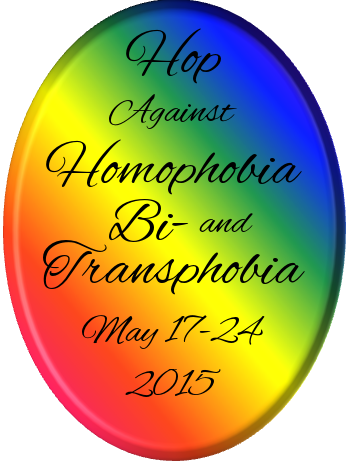[Edited 5/25: Thanks so much for visiting my blog during the Hop! My giveaway has ended and the winner is: H.B.! Check your e-mail. :)]
The Hop Against Homophobia and Bi- and Transphobia is on!
I’m taking part by writing a short blog post and sharing the list of participating writers/bloggers who you should visit. Each of us hosts a giveaway. Drop a comment below, and you’ll be entered to win my recent release Werecat: The Trilogy.
#HAHABT is a weeklong event (May 17th – May 24th) created by writers to join forces for the International Day Against Homophobia and Transphobia. I’ve been participating since I found out about it in 2013.
A writer-led campaign to advance social justice for LGBTs? Yes, please!
I caught the social justice bug at student protests against Cornell University’s investments in Apartheid-era South Africa. I remember the rush of my first demonstration. As individuals, we had no influence on the university’s financial practices, let alone the situation in South Africa. Together, we were strong and filled with belief.
I joined Take Back the Night marches to eliminate violence against women. In the early 90s, I demonstrated to protest the first Gulf War. When I came out as gay, I marched to protest gay-bashings, religious condemnation, and government inaction on the AIDS crisis.
Activism has changed in the digital age. We take to Twitter, Facebook and online petitions instead of taking it to the steps of City Hall or stopping traffic on Main Street. An important, recent exception is the “Black Spring” to protest police brutality, which has called for traditional strategies of civil disobedience. But generally we communicate and organize in different ways.
I miss the real-life camaraderie and the homespun feel of old school social action. One of my fondest memories is when a group of friends was so energized to counter-protest a “pro-life” group targeting Planned Parenthood that we had an all-night party painting signs, talking politics, and of course tossing back a sizeable quantity of beer.
But a good case can made that technology has made activism more effective. Taking for instance the reaction to the state of Indiana’s regressive legislation to sanction religious bigotry, social media can be a powerful platform for change. The flood of memes (#boycottindiana) with personal testimonials on Facebook and Twitter created a tidal wave of social pressure. That nationwide phenomenon had impact on corporations and elected officials that I don’t believe would have happened through local demonstrations alone.
As a fantasy author, I don’t very often write explicitly about homophobia or transphobia in a modern context. I do think a lot about how fairly I portray sexuality, gender and “race.” One of my current manuscripts features a lesbian character for example who happens to look physically male and to express herself in a “masculine” way, and I puzzled for some time about what that would say to readers since she is the only lesbian in the story.
We need more diverse portrayals of LGBTs in books. I don’t claim to be the authority on how to do that well in every instance though my gut feeling is that it’s a good thing when writers question what we write and ask people who are representative of the characters we’re writing about for feedback.
I’ll stop there and look forward to your comments. Feel free to fill your red, plastic Dixie cup from my virtual keg while you’re here. Leave your e-mail address if you would like to enter a drawing for an e-copy of my latest book Werecat: The Trilogy. I will pick a winner through random.com on May 25th 12:00 AM EST.
And don’t forget to click below to check out some of the 100+ writers/bloggers who are participating in #HAHABT this year:
<script type=”text/javascript” src=”http://www.simply-linked.

